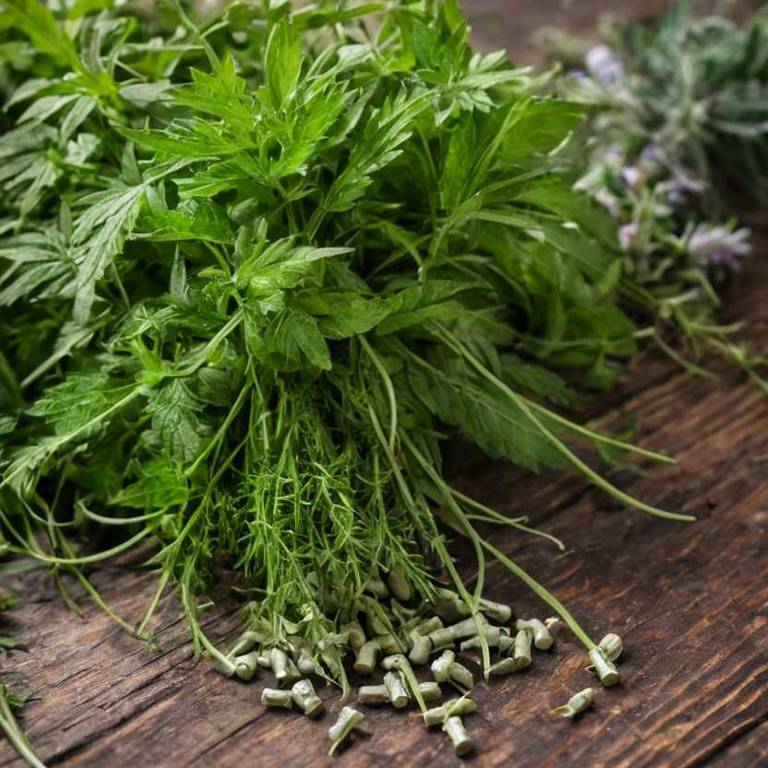Pogostemon (Pogostemon cablin)
Pogostemon (Pogostemon cablin) is a member of the Lamiaceae family, native to Southeast Asia, Indonesia, and China. Traditionally, its leaves, stems, and rhizomes have been used for infusions, decoctions, and oil infusions.
This herb is particularly valued for its anti-inflammatory, carminative, and tonic actions, and has a long history of use in ayurvedic medicine, traditional chinese medicine, and japanese kampo medicine.

Quick Facts / Key Information
| Common Name | Pogostemon |
|---|---|
| Scientific Name | Pogostemon cablin |
| Plant Family | Lamiaceae |
| Genus | Pogostemon |
| Species | cablin |
| Native Range | Southeast Asia, Indonesia, China |
| Plant Parts Used | Leaves, Stems, Rhizomes |
| Primary Medicinal Actions | Anti-Inflammatory, Carminative, Tonic |
| Primary Traditional Systems | Ayurvedic Medicine, Traditional Chinese Medicine, Japanese Kampo Medicine |
| Historical Preparation Methods | Infusion, Decoction, Oil Infusion |
Botanical Identity
- Scientific Name
- Pogostemon cablin
- Common Name
- Pogostemon
- Synonyms / Alternative Names
- Java Mint, Lemongrass, Citron Grass
- Plant Family
- Lamiaceae
- Genus
- Pogostemon
Botanical Description
- Growth Habit
- Perennial herbaceous plant.
- Height
- It typically grows to a height of 30 to 100 centimeters.
- Leaves
- Lateral, opposite, narrowly elliptic leaves with dark green upper surface and lighter green lower surface, featuring prominent stomatal bands along the midrib.
- Flowers
- Bilaterally symmetrical flowers with two lips, the upper lip two-lobed and the lower lip three-lobed, pale yellow to reddish brown markings on the lower lip, arranged in dense spikes.
- Stems
- Erect, herbaceous, glabrous, four-sided, with opposite, ascending branches.
Traditional Uses / Historical Use
Traditional Systems
- Ayurvedic Medicine
- Traditional Chinese Medicine
- Japanese Kampo Medicine
Historical Preparation Methods
- Infusion
- Decoction
- Oil Infusion
- Tincture
Medicinal Actions
- Anti-inflammatory
- As described in traditional systems, a moderate anti-inflammatory, for general calming applications.
- Carminative
- Commonly referenced as a soothing carminative, for digestive process support.
- Tonic
- Traditionally described as a warming tonic, for broad-use formulations.
- Stimulant
- In herbal texts, considered a cooling stimulant, in wakefulness-related contexts.
Active Compounds
- Essential Oil
- A mixture of naturally occurring compounds responsible for plant aroma.
- Flavonoid
- A widely occurring class of plant polyphenols found in leaves, flowers, and fruits.
- Terpenoid
- Plant-produced compounds commonly found in essential oils and resins.
- Coumarin
- Plant-derived compounds often associated with fragrance-related chemistry.
Modern Research Overview
Scientific research related to this plant is ongoing. This section will be expanded in the future to include summaries of phytochemical studies, laboratory research, and other relevant scientific literature as it becomes available.
Safety & Contraindications
- General Precautions
- Precautionary considerations have been reported in relation to this herb.
- Contraindications
- Contraindications for this herb are not clearly established in available sources.
- Allergies
- Allergic reactions associated with this herb have not been well documented.
- Drug Interactions
- Available information regarding interactions with pharmaceutical drugs is limited.
- Toxicity
- The toxicity profile of this herb has not been clearly established.
- Pregnancy & Breastfeeding
- There is insufficient evidence to determine the safety of this herb during pregnancy or breastfeeding.
Preparation & Usage Methods
- Infusion
- Water is poured over plant material and allowed to steep before straining.
- Decoction
- This method uses sustained heat to extract compounds from firm plant structures.
- Poultice
- Poultices involve external application of prepared plant matter.
- Capsule
- Powdered plant material is enclosed in a capsule for oral consumption.
- Tincture
- Alcohol is used as a solvent to extract plant constituents over time.
Growing, Harvesting & Storage
Growing / Cultivation
- Soil
- Prefers loamy soil with well-drained conditions. Typically grows best in organically rich soils.
- Sunlight
- Thrives in full sun. Tolerates full sun to partial shade.
- Watering
- Prefers well-balanced moisture levels. Tolerates periodic dry conditions.
Medical Disclaimer
The information provided on this page is for educational and informational purposes only. It is not intended to diagnose, treat, cure, or prevent any medical condition. Always consult a qualified healthcare professional before using any herb for medicinal purposes.